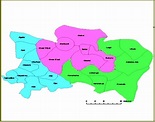Following the confirmation of Ebola outbreak by Uganda in Wakiso, Mukono and Mbale city in Mbale district, the Nigeria Centre for Disease Control and Prevention (NCDC) has activated emergency measures to prevent potential importation of the disease into Nigeria.
The initial symptoms of Ebola includes sudden onset of high fever accompanied by other nonspecific signs and symptoms such
as headache, body aches, muscle pain and weakness, vomiting and diarrhea, Jaundice yellowing of the eye
After the onset of the above symptoms, in severe cases there maybe uncontrolled bleeding from orifices, dysfunction and / or failure of several body organs such as the kidneys, liver, central nervous system involvement, progressing to shock and death.
In fatal cases, death often occurs between 8 and 9 days of the onset of symptoms
Although the virus has not been detected in Nigeria, the NCDC in an advisory signed by its Director General, Dr. Jide Idris on Sunday in Abuja, disclosed that the agency alongside partners, relevant Ministries, Departments and Agencies (MDAs), have heightened surveillance and strengthened preparedness in Nigeria.
He said: “On 30th January 2025 the Ministry of Health in Uganda confirmed an outbreak of the Ebola virus disease (EVD) caused by the Sudan specie.
“There are no cases of Ebola virus disease in Nigeria. However, the in collaboration with relevant Ministries, Departments, Agencies,
and Partners through the National Emerging Viral Hemorrhagic Diseases (EVHD) Technical
Working Group, continues to monitor disease occurrence and has initiated measures to
strengthen our preparedness in the country.
“These include the update of our EVD emergency contingency plan, heightened surveillance especially at the points of entry, and optimizing diagnostic capacity for EVD testing in designated laboratories in cities with international airports of entry and the National Reference Laboratory.
“In addition, all Lassa Fever testing laboratories can be activated to scale up testing if the need arises.”
The NCDC boss who warned that available vaccines and therapeutics though not present in Nigeria do not offer protection from the Sudan specie of the Ebola virus, advised Nigerians to practice good hand hygiene, avoid physical touch with anyone infected, avoid consumption of bush meat especially bats and non human primates.
“There are vaccines and therapeutics available for some strains of the Ebola virus. The approved vaccine for the Zaire species (EBV) is not currently available in the country but can be obtained from the WHO Afro and does not protect against the Sudan virus.
“However, early recognition, isolation of patients, and initiation of supportive treatment, implementing infection and control
measures in health facilities and homes, tracing and monitoring of contacts, and safe burial practices, significantly reduce morbidity and the probability of death.
“Nigerians are therefore urged to adhere strictly to the following preventive measures:
Wash your hands regularly with soap under running water or use hand sanitizers when soap and water are not readily available, avoid physical contact with anyone who has symptoms of an infection with an unknown
diagnosis, avoid the consumption of bush meat, particularly bats and non-human primates, which are known reservoirs of the Ebola virus and if you have to, ensure that such is properly prepared and cooked before consumption.
“Avoid direct contact with the blood, saliva, vomit, urine, and other bodily fluids of
suspected or confirmed EVD cases, If you or someone you know (with a travel history to any country with Ebola cases) experiences symptoms of EVD enumerated above, call 6232 or your State Ministry of
Health hotline immediately for guidance.”
Ebola virus disease (EVD), formerly known as Ebola Hemorrhagic Fever, is a severe, often deadly disease caused by the Ebola virus, with a fatality rate of 25-90%. There are 5 distinct species of the virus: Bundibugyo, Zaire the most fatal of all the five strains, and responsible for the most EVD outbreaks including the 2014-2016 outbreak in West Africa,.Reston, Tai Forest, and the
Sudan responsible for the outbreak in Uganda.
The infection is transmitted from animals to humans, with human-to-human transmission
occurring through direct contact with the body fluids (blood, saliva, vomit, urine, feces, sweat,
breast milk and semen of an infected person), contaminated objects, or infected animals such as fruit bats, chimpanzees, gorillas, monkeys, porcupines and forest antelope.
The virus can also be transmitted through contact with wildlife and unsafe burial practices. The incubation period, i.e.
from exposure to the development of signs and symptoms ranges from 2-21 days. During an outbreak, those at risk of infection are health workers, family members and others in close contact with sick people and deceased patients.
“On our part, we will continue to strengthen surveillance across the country, including our borders and airports especially for travelers from affected areas; alerting our health workers to heighten their level of suspicion for suspected cases; enhancing our laboratory capacities for quick testing
of suspected cases; as well coordination with the WHO and the African Regional Health
Authorities to monitor developments and share critical information,” Dr. Idris added.








